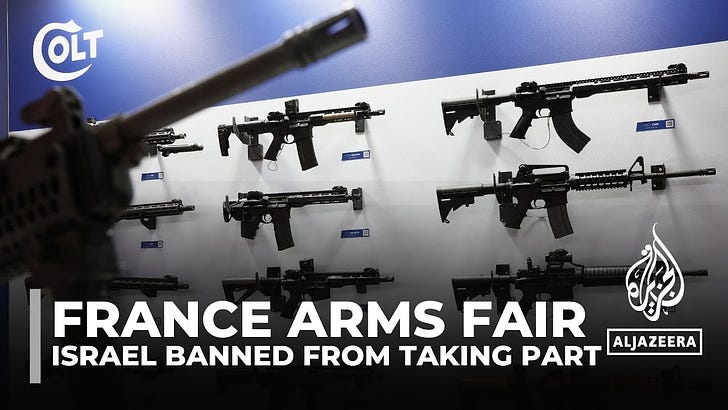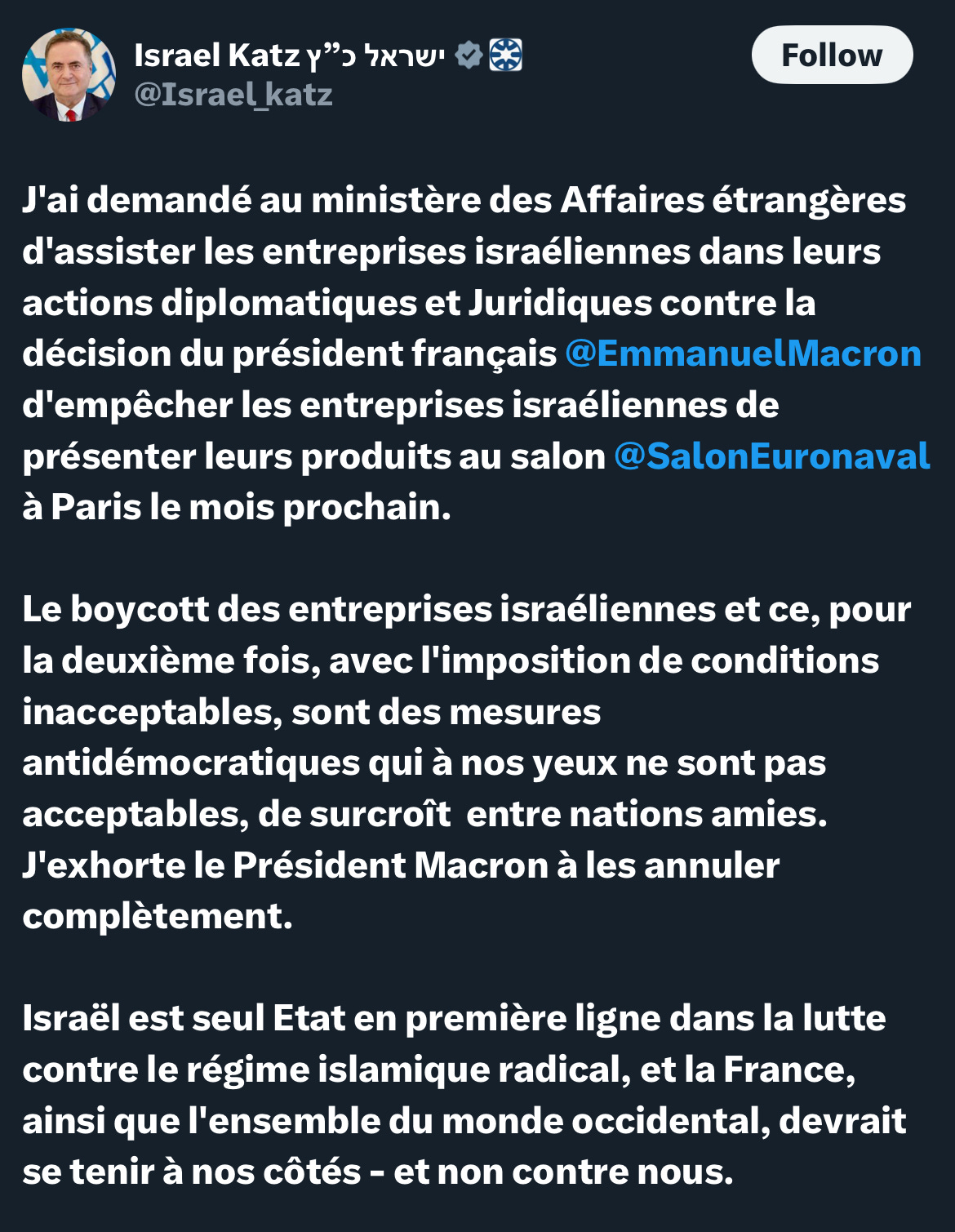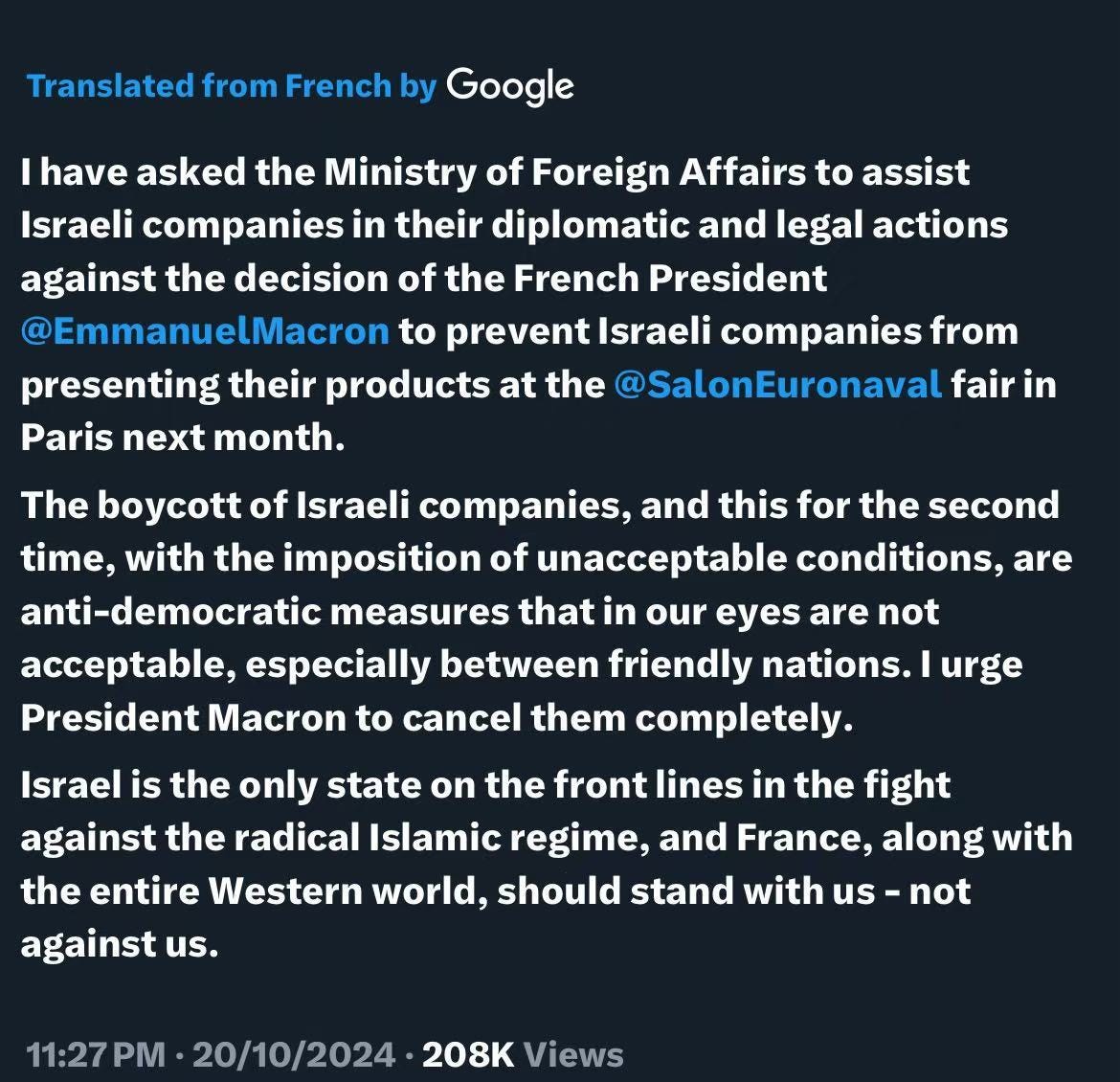The Israel-France Rift Over Defense Exhibitions
This is undemocratic behavior that is unacceptable between friendly countries." - Israeli Foreign Minister Israel Katz
At the heart of this controversy lies France’s decision to bar Israeli companies from participating in the upcoming Euronaval defense exhibition, scheduled for November 4-7, 2024, in Paris.
The decision by the French government to exclude Israeli firms from the prestigious naval trade show marks a significant escalation in an already tense relationship. Israeli Foreign Minister Israel Katz’s announcement of legal and diplomatic action against French President Emmanuel Macron underscores the gravity with which Israel views this exclusion. Katz’s statement on social media platform X (formerly Twitter) was unequivocal:
This latest dispute must be understood within the broader context of France’s evolving stance on the Israeli-Palestinian conflict and its repercussions. President Macron has been increasingly vocal in his criticism of Israel’s military actions, particularly in Gaza and Lebanon. As early as November 2023, during an interview with the BBC, Macron called for Israel to cease bombing civilian populations in Gaza, advocated for a humanitarian pause, and urged a prompt ceasefire. These statements, while drawing criticism from Israeli leadership, reflect a consistent French position that has been developing since the Hamas attack on October 7, 2023.
France’s approach to the conflict is based on three pillars: an immediate humanitarian truce, a collective response to the terrorist challenges posed by Hamas, and paving the way for a political solution by ensuring the creation of a Palestinian state, which France sees as necessary for Israel's long-term stability and security. This stance, while aimed at promoting peace and stability in the region, has inevitably led to tensions with Israel, culminating in the current dispute over defense exhibitions.
The exclusion of Israeli companies from Euronaval 2024 affects seven firms, according to the event organizers. While Israeli delegations are still permitted to attend the trade show, they are prohibited from exhibiting stands or showcasing equipment. This partial ban highlights the delicate balance France is attempting to strike between maintaining diplomatic ties with Israel and responding to domestic and international concerns about Israel's military operations.
Israel’s response to this exclusion has been swift and forceful. Foreign Minister Katz's characterization of the ban as "undemocratic behavior that is unacceptable between friendly countries" reflects Israel's view that France's actions constitute discrimination and a breach of the norms governing relations between allied nations. The decision to pursue legal action against President Macron personally is an unusual and aggressive diplomatic move, signaling the depth of Israel's frustration and determination to challenge what it perceives as unfair treatment.
This is not the first time France has taken such action. Earlier in 2024, a similar situation arose when France attempted to ban Israeli companies from another defense exhibition. That decision was ultimately overturned by a Paris commercial court, which ruled it to be discriminatory. The recurrence of this issue suggests a pattern in France's approach to balancing its defense industry interests with its stance on international conflicts.
The Israel-France rift over defense exhibitions is symptomatic of broader shifts in the global geopolitical landscape. As conflicts in the Middle East continue to shape international alliances and public opinion, traditional partnerships are being tested. The actions of both Israel and France in this dispute reflect the increasing intertwining of defense, diplomacy, and domestic politics in an era of heightened global tensions.
For France, the decision to exclude Israeli firms from Euronaval is not made in isolation but is part of a broader diplomatic strategy. France has long played a unique role in the Middle East, balancing its strong ties with Israel against its historical connections and interests in the Arab world. As a Mediterranean power with a colonial history in the region, France has often sought to present itself as a mediator and independent voice in Middle Eastern affairs.
France’s diplomatic involvement in the region dates back to its role as a protector of Christian interests in the Holy Land and its mandate over Lebanon and Syria following World War I. Since recognizing Israel in 1949, France has maintained a strong military and diplomatic partnership with the Jewish state, evident in events such as the 1956 Suez Crisis. However, France has also consistently supported a two-state solution to the Israeli-Palestinian conflict and has not shied away from criticizing Israeli actions when deemed necessary.
The current tensions between France and Israel also have significant domestic implications for both countries. France is home to both the third-largest Jewish community globally and the largest Muslim community in Europe. The Israeli-Palestinian conflict has historically had repercussions in France, and the recent events are no exception. The French government is acutely aware of the potential for the Middle East conflict to fuel tensions within France, especially given the country's recent history of terrorist attacks and anti-Semitic incidents.
President Macron’s government has taken a proactive approach to prevent potential escalation, banning several pro-Palestinian demonstrations while allowing those advocating for peace. A civic march against anti-Semitism in November 2023 gathered tens of thousands in Paris, although it raised controversy due to the participation of far-right movements.
The exclusion of Israeli firms from Euronaval represents more than just a commercial setback for Israel. It is seen as a challenge to its legitimacy on the international stage and a potential precedent that could influence other nations’ approaches to defense cooperation with Israel. The decision to pursue legal action against President Macron is a bold move that signals Israel’s determination to defend its interests and prevent what it sees as discriminatory practices from becoming normalized.
France’s position, meanwhile, reflects the growing influence of public opinion and ethical considerations in shaping foreign policy. The French government's actions suggest a willingness to risk diplomatic tensions in order to align its defense trade policies with its stated positions on international conflicts. This approach raises questions about the long-term implications for France’s defense industry and its relationships with other countries involved in ongoing conflicts.
The dispute also highlights the complex role of the defense industry in international relations. Defense exhibitions like Euronaval are not merely commercial events but also platforms for diplomatic engagement and strategic signaling. The exclusion of Israeli firms from such an event sends a powerful message about France’s stance on the current conflicts and its willingness to use economic levers to influence international behavior.
While France’s ability to facilitate a peaceful resolution to the Israeli-Palestinian conflict may seem constrained, given the limited influence Paris has on Israeli stakeholders, it has not deterred France from taking diplomatic initiatives. In November 2023, Macron initiated an international humanitarian conference for the Gaza population, bringing together 80 countries and organizations. France announced humanitarian funding of over 100 million US dollars, with over one billion committed by all participants.
Moreover, France has demonstrated its commitment to humanitarian efforts by deploying a military helicopter carrier off the coast of Gaza, transformed into a hospital ship to support civilians. The French military has also conducted rotations to deliver humanitarian cargo to the region. Additionally, 700 French soldiers are deployed at the border between Lebanon and Israel for observation and deconfliction missions within the framework of the United Nations Interim Force in Lebanon (UNIFIL).
As this situation unfolds, it will be crucial to monitor its impact on broader Israel-France relations and on the dynamics of international defense cooperation. Will other European countries follow France's lead in restricting Israeli participation in defense exhibitions? How will this affect Israel's defense industry and its relationships with other international partners? And what implications does this have for the future of multilateral efforts to address conflicts in the Middle East?
The Israel-France rift over defense exhibitions is more than a bilateral dispute; it is a microcosm of the challenges facing the international community in balancing ethical considerations, strategic interests, and diplomatic relationships in an increasingly complex global environment. As the legal and diplomatic processes play out, this controversy will likely continue to reverberate through international relations, defense industries, and discussions about the ethics of arms trade in conflict zones.
In conclusion, the exclusion of Israeli firms from Euronaval 2024 and the resulting diplomatic fallout between Israel and France represent a critical juncture in international relations. This dispute encapsulates the tensions between economic interests, ethical foreign policy, and the realities of ongoing conflicts. As both nations navigate these troubled waters, the international community watches closely, aware that the resolution of this conflict could set important precedents for how countries balance defense cooperation with political and ethical considerations in an increasingly interconnected world.
Food for Thought:
How might the outcome of this dispute influence other countries’ approaches to defense cooperation with nations involved in active conflicts?
What are the potential long-term consequences of using trade shows and economic platforms as tools for diplomatic pressure?
How can nations balance the need for defense industry cooperation with ethical considerations in foreign policy?
In an era of increasing global tensions, what role should international defense exhibitions play in fostering dialogue and promoting responsible arms trade?





